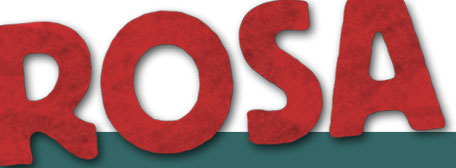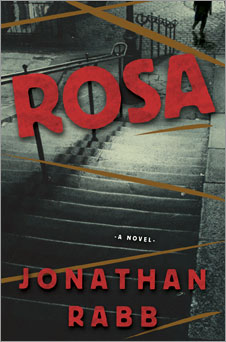An Interview with Jonathan Rabb
1. Your previous books,The Overseer and The Book of Q, were critically acclaimed for your ability to tell a good mystery. How is Rosa a departure from your previous works?
Both Overseer and Q were contemporary thrillers that revolved around historical documents – a 16th-century manuscript of political theory (a response to Machiavelli’s Prince), and a 4th-century tract of Manichaean liturgy that drew into question the Resurrection and other early Christian doctrines. But the stories took place today. I always felt that the strongest elements of my first two books were the historical touches, and so I decided to dive into a historical period entirely with Rosa. The book takes place in Berlin of 1919, just after the end of the First World War when the city was struggling to define itself. It’s a wonderfully nebulous period and therefore lends itself beautifully to a book that takes uncertainty as one of its central themes. I also shied away from the “fish out of water who must save the world” story-line, which had dominated my first two books. Berlin in 1919 is ominous enough to a modern reader. We know what’s about to happen (although Nazism wouldn’t really take a strong foothold for another ten years), and we know (from Isherwood, Cabaret, etc.) what the 20s hold in store. 1919 sits at the brink of all of that. Berlin at that moment also allowed me to explore certain kinds of characters I had never attempted. In Overseer and Q, my main characters in each are, to a greater or lesser extent, versions of myself. Nikolai Hoffner is a big departure for me and, I think, my strongest character to date. I suppose I needed a bit of time to have the courage to create someone at the core of a book who wasn’t me. And finally, Rosa doesn’t end with the kind of resolution Overseer and Q do. How could it? There’s still too much to come in the life of Berlin, and, for that matter, in the life of Nikolai Hoffner.
2. Rosa is a fantastic thriller, but it’s also about political intrigue, love, betrayal, and how people and organizations manipulate the politics of fear. What do you hope people will get from Rosa?
I suppose, on the most basic level, I want them to feel as if they’ve been transported to a very specific moment in time, where circumstances, characters and settings are completely unfamiliar, and yet which feel oddly familiar because of the way in which those characters grapple with the choices laid in front of them. In that way, a reader can venture into an unknown world and find novelty in the place itself, but feel grounded in the motivations behind the actions. Rosa Luxemburg, socialist revolution, the nascent stages of Nazism are specific to that moment and are, for most people, untried territory. Hoffner’s willingness to look beyond what others want him to see, his inability to keep himself from betraying his partner and his own family – all in the cause of unraveling the mystery surrounding Rosa – make him profoundly flawed and all too human. He would make the same choices in 2005; he just happens to live in 1919. From the perspective of 2005, it shouldn’t be hard to see how the politics of fear can pay great dividends. The tactic lies at the core of the book (and would, of course, become one of the most powerful tools in the Nazi arsenal). I suppose that’s something else a modern reader can find familiar.
3. Berlin is one of the novel’s central characters. What aspect of Berlin did you most enjoy depicting and what research did you do?
Of course, the Berlin of 1919 no longer exists, but then again, neither does the Berlin of 1989 or 1991. In the last fifteen years, Berlin has once again gone through a tremendous transformation, which seems to be what has always defined the city. Berlin is a relatively young city, and an even younger capital. It wasn’t until the late 19th century that Berlin became the center of the then recently created Germany, and it survived in that form only until 1945. But what was most remarkable in the research, and therefore most fun to depict in the book, was finding out how Berlin has always been a city divided by east and west, with or without a wall to cement that division. The west was always the place of privilege, social standing, and money; the east was where Berlin’s working class, and worse, lived. Seeing the two sides of the city, and finding the conduits between them and the strict disconnects, gave the city a contour that really helped to bring it alive. Hoffner, of course, sees Berlin as a she, and I think that makes sense given that his world (at least in the book) is defined by the women who force his hand – Martha his wife, Lina his mistress, and Rosa. It’s telling that, in understanding Berlin, Hoffner says she becomes clear to him not in her patterns, but in her discrepancies. I think that tells us a lot about Hoffner and women.
As for the research, I read some really wonderful secondary texts. David Clay Large’s “Berlin” is a fantastic piece that takes Berlin from her inception to present day. Peter Fritzsche’s Reading Berlin depicts Berlin as a “word” city, which really stuck with me, and worked perfectly for Hoffner. For the police details, His-huey Liang’s The Berlin Police Force in the Weimar Republic was an unbelievable find. From the title, it’s probably not what most people would find compelling reading, but my wife can attest to my enthusiasm: the book arrived at 2PM one afternoon and I was unavailable until midnight that night poring through the pages.
On Rosa Luxemburg, her general letters, and her letters to Leo Jogiches, gave a wonderful human background to the political madness that always seemed to surround her.
But the most helpful books for research were the novels written at the time. Döblin’s Berlin Alexanderplatz and Karl and Rosa are two of the most powerful pieces of fiction of the time. Nabokov’s King, Queen, Knave brings the city to life as only Nabokov can. And Remarque’s Three Comrades gives a searing vision of Berlin in the aftermath of the war. Finally, Roth’s feuilletons in the collection What I Saw are invaluable snapshots into the seedier side of life in Berlin at the time.
4. What do you think Rosa Luxemburg’s appeal is today?
It’s hard to find a figure in the early years of the last century who
captures the imagination like Rosa. She is at once a brilliant theorist – she
takes Marx’s economic thought and makes it both understandable and relevant
to the 20th century; she is a true revolutionary who poses so great a threat
to the German government that they throw her into prison for most of the First
World War “for her own protection;” she is there with Lenin and
Trotsky when they develop their plans for revolution, and she publicly breaks
with them when she tells them that they’ve got the whole thing wrong
(she was, of course, right); she is something of the femme fatale of the German
socialist movement – even though a cripple – claiming among her
lovers Paul Levi, Leo Jogiches, and a slew of others; and she dies in the
most heroic and tragic way imaginable: on the run after sending a country
into revolution, forcing a Kaiser into abdication, and awakening a people
to their own potential. And she was a Polish Jewish woman at a time
when any one of those three labels should have made her impotent. This
was a remarkable individual who didn’t let her gender or her background
compromise her convictions, which were so powerful that the establishment
couldn’t ignore her. That makes her appealing to any generation
5. Do you see a Rosa Luxemburg or a Polpo in any social or political movements today? Did you base her on anyone we know today?
Rosa is one of a kind, and there is so much of her in her letters that it wasn’t necessary to look anywhere else to imagine her. Nonetheless, this is fiction, and I was very selective in the pieces of her I chose to put together. Did she have that profound sense of isolation I ascribe to her, this woman who never wavered publicly in her convictions? Perhaps. There are elliptical references to it, but I can’t say it was there with certainty. Even so, it seemed too perfect given Hoffner’s condition not to play it up.
Are there Rosas in movements today? Of course, but it’s rare to find someone who has the will to topple a regime and who also happens to be a brilliant thinker. Vaclav Havel in the Czech Republic comes to mind, though he didn’t spend his life plotting the overthrow of the government; Nelson Mandela in South Africa, who lived most of his life in prison waiting for the moment of revolution, is another. And, of course, there are Polpos everywhere, those government agencies that act above the law (or without any respect for it) in the name of security. That takes us back to the politics of fear, where a threat (named or unnamed) can unleash the worst kinds of abuses on individual freedoms.
6. Did Rosa Luxemburg, in your view, contribute to the rise of Hitler and Nazism?
No, if by contribute you mean that she helped to lead Germany down the path to Nazism. Then again, the Nazis did use her memory as a way to bolster their own following. In their eyes, she embodied the two most hated elements in German society, the Bolshevik and the Jew (even though Rosa would never have considered herself a Bolshevik). Rosa and her revolution represented all that had gone wrong with the country after the First World War, and that still remained a threat during the Weimar period. According to the Nazis, the socialists had forced a German army still willing to fight (and win) into capitulation; in that way, the socialists were responsible for the Versailles Treaty, the reparations, and Germany’s humiliation (and loss of national identity). Since most of the socialists were Jews (according to the Nazis), they had also helped to make the Jewish industrialists rich throughout the war (which, of course, makes no sense whatsoever). Did she make it easier for the Nazis to rise to power? You could argue that the Weimar government never fully recovered from the revolution, and that Germany’s instability in the 20s (the inflation and political unrest) were simply extensions of a revolution that had never fully been quelled (and that the victor was ultimately the right, not the left). But it would be wrongheaded to blame Rosa for what the Nazis eventually attributed to her; that she became their whipping girl had nothing to do with what she tried to accomplish and all to do with the Nazi propaganda machine.


